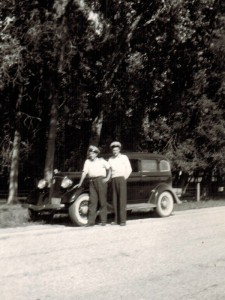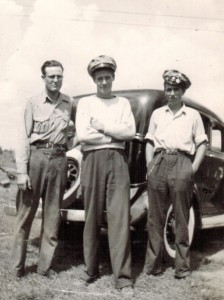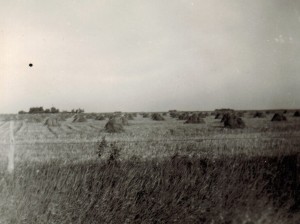 After spending some time in the early spring of 1940, working for the railroad in the car repair department, my uncle, William Malrose Spencer, decided the work was not for him. He quit the job that paid him 38¢ an hour…an amount that made every kid in Holyoke, Minnesota green with envy. With some of the money he had made, he purchased a 1934 Plymouth for which he paid $65.00. I’m sure that was a lot of money to pay for a car back then, but today, we would not get much of a car for $65.00. Nevertheless, in 1940, $65.00 bought my uncle a car that was only six years old, and that is truly amazing. No wonder the kids in town were envious of my Uncle Bill’s great job. At 18 years of age,
After spending some time in the early spring of 1940, working for the railroad in the car repair department, my uncle, William Malrose Spencer, decided the work was not for him. He quit the job that paid him 38¢ an hour…an amount that made every kid in Holyoke, Minnesota green with envy. With some of the money he had made, he purchased a 1934 Plymouth for which he paid $65.00. I’m sure that was a lot of money to pay for a car back then, but today, we would not get much of a car for $65.00. Nevertheless, in 1940, $65.00 bought my uncle a car that was only six years old, and that is truly amazing. No wonder the kids in town were envious of my Uncle Bill’s great job. At 18 years of age,  he must have seemed quite grown up.
he must have seemed quite grown up.
After leaving the railroad, Uncle Bill returned home in early June…just in time to make hay, which took most of the month of June. Toward the end of June, Uncle Bill decided to head out to North Dakota to work in the harvest fields out there. Although he was only 16 years of age, my dad, Allen Lewis Spencer and their friend, Bob Croft decided to go along. So, they loaded up in Uncle Bill’s 1934 Plymouth and headed out. Their plan was to work in different harvest ready fields along their way.
This all seems like an easy money scheme, until you think about the fact that this trip was made during the pre-combine years. At that time, the grain was cut with a binder and then hauled to the threshing machine, with horses and wagons. Of course, all this was  done in the heat of the day, and the men didn’t really wear tank tops and shorts back then. They simply sweated it out. The work was not easy either. There was a lot of bending, lifting, loading, and unloading. They worked liked dogs from sun up to sun down, but that was just the way things were done back then.
done in the heat of the day, and the men didn’t really wear tank tops and shorts back then. They simply sweated it out. The work was not easy either. There was a lot of bending, lifting, loading, and unloading. They worked liked dogs from sun up to sun down, but that was just the way things were done back then.
The guys spent the rest of that summer in the fields of North Dakota, before returning home when the harvest was done. Uncle Bill says that the trip was quite the adventure, but they made a little money while they were at it, so it was worth it in the end.


Leave a Reply